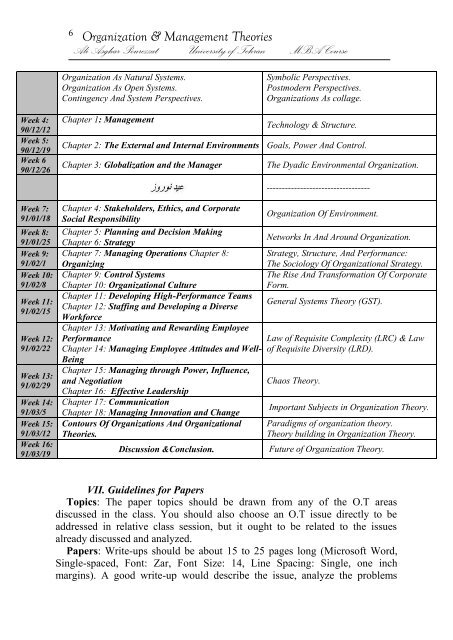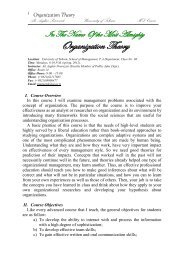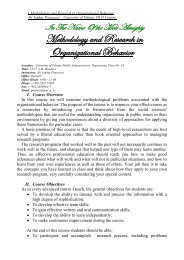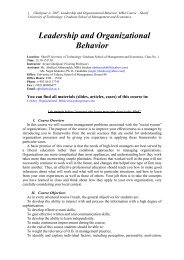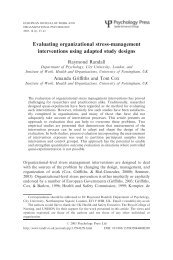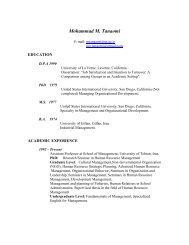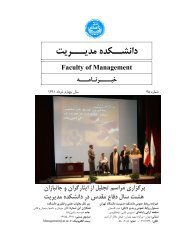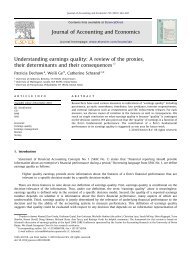Organization & Management Theories Ali Asghar Pourezzat ...
Organization & Management Theories Ali Asghar Pourezzat ...
Organization & Management Theories Ali Asghar Pourezzat ...
You also want an ePaper? Increase the reach of your titles
YUMPU automatically turns print PDFs into web optimized ePapers that Google loves.
6<br />
<strong>Organization</strong> & <strong>Management</strong> <strong>Theories</strong><br />
<strong>Ali</strong> <strong>Asghar</strong> <strong>Pourezzat</strong> University of Tehran MBA Course<br />
Week 4:<br />
90/12/12<br />
Week 5:<br />
90/12/19<br />
Week 6<br />
90/12/26<br />
<strong>Organization</strong> As Natural Systems.<br />
<strong>Organization</strong> As Open Systems.<br />
Contingency And System Perspectives.<br />
Chapter 1: <strong>Management</strong><br />
Chapter 2: The External and Internal Environments<br />
Chapter 3: Globalization and the Manager<br />
Symbolic Perspectives.<br />
Postmodern Perspectives.<br />
<strong>Organization</strong>s As collage.<br />
Technology & Structure.<br />
Goals, Power And Control.<br />
The Dyadic Environmental <strong>Organization</strong>.<br />
----------------------------------<br />
Week 7:<br />
91/01/18<br />
Week 8:<br />
91/01/25<br />
Week 9:<br />
91/02/1<br />
Week 10:<br />
91/02/8<br />
Week 11:<br />
91/02/15<br />
Week 12:<br />
91/02/22<br />
Week 13:<br />
91/02/29<br />
Week 14:<br />
91/03/5<br />
Week 15:<br />
91/03/12<br />
Week 16:<br />
91/03/19<br />
Chapter 4: Stakeholders, Ethics, and Corporate<br />
Social Responsibility<br />
Chapter 5: Planning and Decision Making<br />
Chapter 6: Strategy<br />
Chapter 7: Managing Operations Chapter 8:<br />
Organizing<br />
Chapter 9: Control Systems<br />
Chapter 10: <strong>Organization</strong>al Culture<br />
Chapter 11: Developing High-Performance Teams<br />
Chapter 12: Staffing and Developing a Diverse<br />
Workforce<br />
Chapter 13: Motivating and Rewarding Employee<br />
Performance<br />
Chapter 14: Managing Employee Attitudes and Well-<br />
Being<br />
Chapter 15: Managing through Power, Influence,<br />
and Negotiation<br />
Chapter 16: Effective Leadership<br />
Chapter 17: Communication<br />
Chapter 18: Managing Innovation and Change<br />
Contours Of <strong>Organization</strong>s And <strong>Organization</strong>al<br />
<strong>Theories</strong>.<br />
Discussion &Conclusion.<br />
<strong>Organization</strong> Of Environment.<br />
Networks In And Around <strong>Organization</strong>.<br />
Strategy, Structure, And Performance:<br />
The Sociology Of <strong>Organization</strong>al Strategy.<br />
The Rise And Transformation Of Corporate<br />
Form.<br />
General Systems Theory (GST).<br />
Law of Requisite Complexity (LRC) & Law<br />
of Requisite Diversity (LRD).<br />
Chaos Theory.<br />
Important Subjects in <strong>Organization</strong> Theory.<br />
Paradigms of organization theory.<br />
Theory building in <strong>Organization</strong> Theory.<br />
Future of <strong>Organization</strong> Theory.<br />
VII. Guidelines for Papers<br />
Topics: The paper topics should be drawn from any of the O.T areas<br />
discussed in the class. You should also choose an O.T issue directly to be<br />
addressed in relative class session, but it ought to be related to the issues<br />
already discussed and analyzed.<br />
Papers: Write-ups should be about 15 to 25 pages long (Microsoft Word,<br />
Single-spaced, Font: Zar, Font Size: 14, Line Spacing: Single, one inch<br />
margins). A good write-up would describe the issue, analyze the problems


